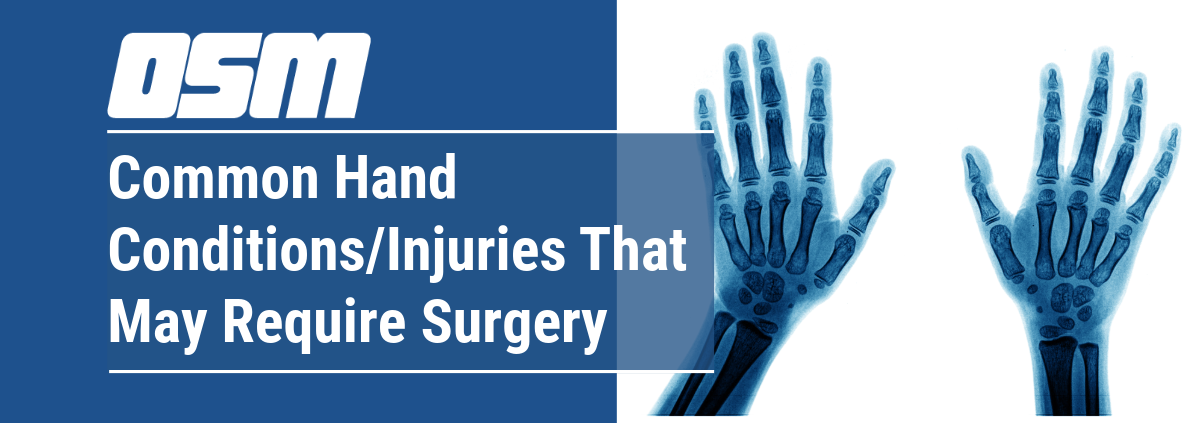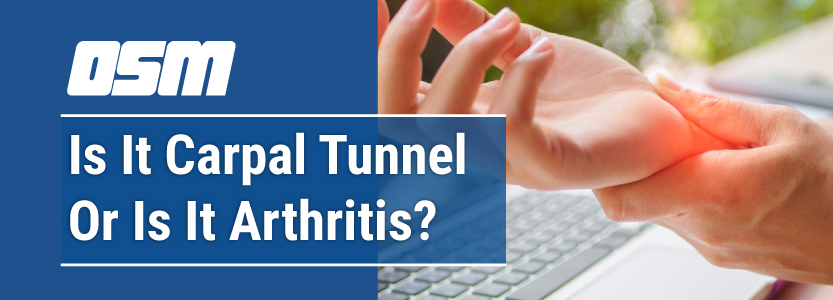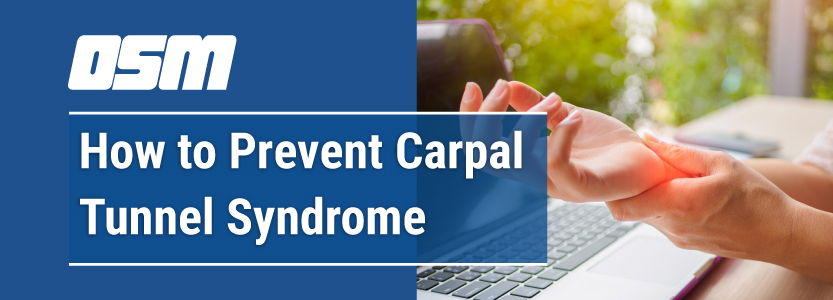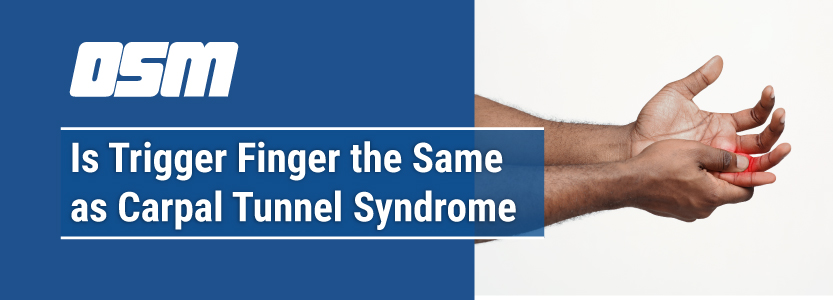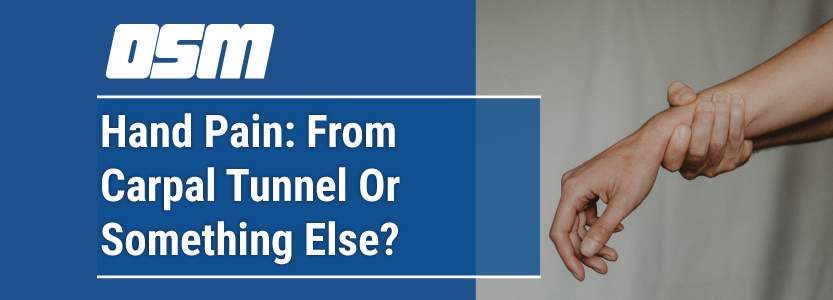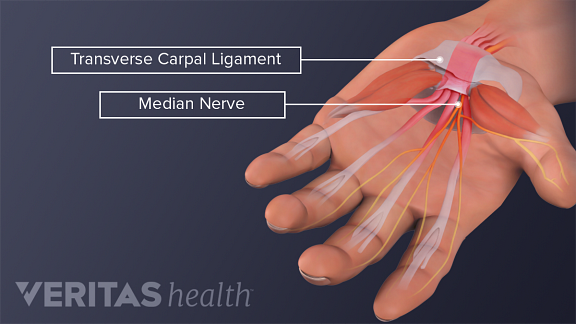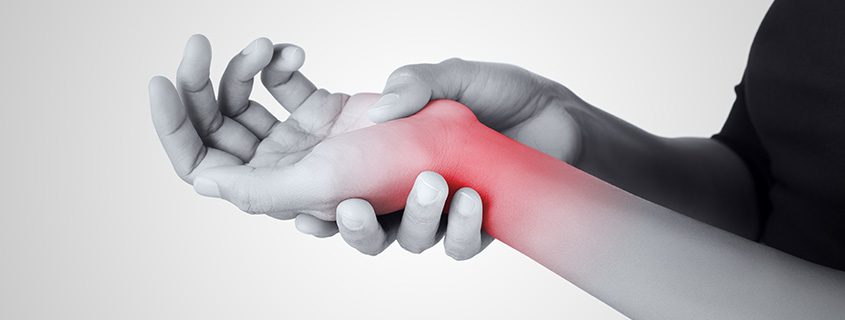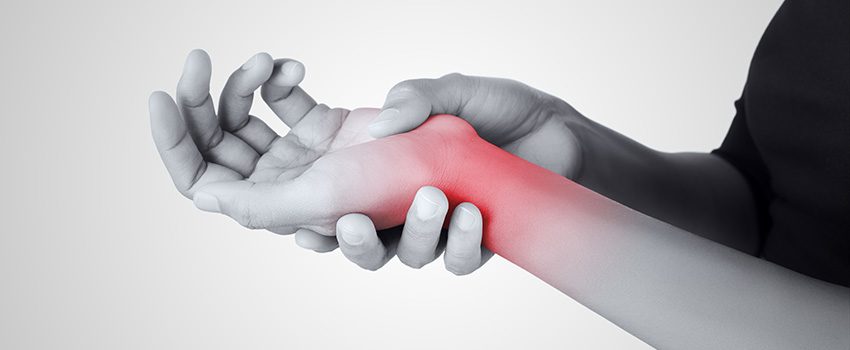Article featured on Modern Orthopaedics of New Jersey
The hand is one of the most complex and active parts of the body. For many people, hands and wrists are responsible for several of their day-to-day activities. Hands possess the ability to prepare meals, create art, play music, and perform jobs such as typing, building, massaging, and more.
Unless you experience a painful hand condition or injury.
Some people don’t realize how much they rely on their hands until they hurt. Many common conditions or injuries can impact how you use your hands, but luckily, most can get better through treatments including at times hand procedures.
So how do you know which common hand conditions may require surgery?
We’re glad you asked.
Carpal Tunnel Syndrome
Carpal tunnel syndrome is often characterized by an uncomfortable numbness and tingling and at times “electrical shocks” in the thumb, index, middle, and ring fingers. This condition is caused by pressure on the median nerve as it travels through the carpal tunnel at the base of the palm. The carpal tunnel is made up of the carpal bones on one side and the transverse carpal ligament on the other side. The tunnel doesn’t stretch at all, so when pressure increases inside the tunnel from either overuse, an injury, or medical condition like diabetes, the nerve can get compressed that can cause these symptoms of tingling, pain, numbness, and sometimes weakness.
Carpal tunnel syndrome can vary in severity. Some people with mild carpal tunnel syndrome symptoms don’t need surgical treatment to relieve the issue, and could respond to more simple measures of rest, bracing, hand therapy, or cortisone injections, ‘among other conservative treatment options. Other people who have moderate to severe carpal tunnel syndrome symptoms may experience more intense and painful and/or dysfunctional symptoms that may require surgery.
At-Risk Demographics for Carpal Tunnel Syndrome
Genetics can play a role in developing carpal tunnel, but early evaluations can prevent the condition from worsening.
Several factors increase the risk of carpal tunnel, such as:
- Being female between the age of 30-60
- Wrist fractures or dislocations
- Wrist Arthritis
- Obesity
- Diabetes and other medical conditions
- Repetitive use
How Can You Prevent Carpal Tunnel Syndrome
If you’re beginning to notice carpal tunnel symptoms at night time or with associated with repetitive use during the daytime, these are some preventative measures you can begin doing:
- Take a break from repetitive activities such as typing or lifting heavy objects.
- Stretch your hand, wrist, and fingers periodically throughout the day.
- Wear wrist braces at nighttime.
- Avoid eating inflammatory processed foods and focus on getting a good night’s sleep.
Thumb Basal Joint Arthritis
Thumb basal joint arthritis (or thumb carpometacarpal joint arthritis) occurs when the cartilage in the basal joint of the thumb (closest to the base of your palm) begins to wear down. At times, this process can be painful and dysfunctional. The basal joint is responsible for moving your thumb, especially when you pinch something between your thumb and index finger.
You may experience pain, stiffness, or swelling when dealing with basal joint arthritis. Sometimes, the painful symptoms can become so severe that you can have difficulty performing basic tasks like turning door knobs, keys, or opening jars.
There are some nonsurgical treatments that can improve symptoms like thumb braces and cortisone injections, however these treatments won’t cure your arthritis. If/when these conservative treatment approaches stop working and the thumb pain persists, Orthopaedic Hand Surgeons in New Jersey can perform a surgery called a “basal joint arthroplasty.” During this surgery, your surgeon will remove the arthritic trapezium bone and use a suspension technique to support the intact thumb. This type of surgery is a time-tested, classic technique for basal joint arthritis that has also been incrementally upgraded over the years by our expert surgeons to minimize your post-operative pain and recovery time.
How Can You Avoid Basal Joint Arthritis
First, there is likely a strong genetic predisposition to osteoarthritis in the thumb, so whether you develop basal joint arthritis or not is likely something that is out of your control! However, even if you do develop thumb basal joint arthritis, there is a good possibility that it may not cause pain or dysfunction. X-ray evidence of basal joint arthritis alone (without pain) does not require any treatment.
If you do develop pain from thumb basal joint arthritis, there are a few ways you can help avoid the risk of basal joint arthritis. First, try to avoid repetitive pinching or twisting activities that you know may aggravate the thumb pain. You can also alternate between a hot and cold compress to relieve the discomfort. Lastly, if you can tolerate these medications, you may try a short course of over-the-counter medications like tylenol or NSAIDs (Advil, Motrin, Aleve). Finally, a course of hand therapy with a certified hand therapist (CHT) can also be an effective strategy for improving pain.
Trigger Finger
Trigger finger, also referred to as stenosing tenosynovitis, is a hand condition in which your finger (most commonly the thumb or ring finger) can begin to hurt in the palm area and be accompanied by a mechanical “triggering” process that can either be painful or non-painful when you flex and extend the affected finger. As this condition worsens, the affected finger may become locked in a flexed position and may even need to be “unlocked” manually using your other hand. Trigger finger is typically caused by thickening of either the tendon, or the gliding tissue that surrounds the flexor tendons.
The first line of treatment for trigger finger is a cortisone injection. Cortisone is effective at curing the triggering around 70% of the time, but is less effective (~50%) in people who have diabetes. If a cortisone injection is initially effective but recurs after several months, a repeat cortisone injection can be performed. A lifetime maximum of 2 injections is possible for each finger. Additional cortisone injections at each finger can put the tendons at risk for rupture.
If a cortisone injection is not effective, a small procedure can be performed to release the constrictive pulley around the thickened tendon to eliminate the triggering.
At-Risk Demographics for Trigger Finger
- Trigger finger more commonly occurs in women.
- Diabetes and rheumatoid arthritis can increase the risk of trigger finger.
- Repeated gripping can increase the development of trigger finger.
How You Can Prevent Trigger Finger
Stretching exercises are one of the best ways to prevent trigger finger. Some specific stretches/exercises that can help involve:
- Finger Spread: Pinch the tips of your fingers and thumbs together and place an elastic band around them. Once the band is around your fingers, practice spreading them open. Repeat 10 times.
- Object Pickups: Put small objects on a table, like coins or buttons, and pick them up one at a time by gripping them with your affected finger and thumb. Repeat this exercise at least twice a day.
Hand and Wrist Fractures
Hand and wrist fractures are common, as you can get hurt during physical activity like sports, car accidents, etc. The fractures can be non-displaced, meaning the bone may remain in position or displaced, which means your bone is out of position. Some bones, like the distal radius, can be realigned/set by a doctor using a manipulation technique after the area has been numbed with local anesthesia.
Other hand and wrist fractures, like carpal bones (scaphoid, triquetrum, etc) may need to be realigned surgically to achieve the best result following these injuries and to ensure timely healing. Surgery for these bones involves directly or indirectly realigning the bones to their original position, like putting a puzzle piece in place, and then stabilizing the fracture with screws and sometimes plates.
Recovering From Hand and Wrist Fractures
A hand or wrist fracture can take some time to heal fully. Each bone and fracture characteristic has its own unique timeline for healing. Always consult with a board-certified HAND surgeon, and if you are in the Northern NJ region, our board-certified hand surgeons at Modern Orthopaedics of New Jersey would be happy to evaluate and treat your fracture. It is very important to see an orthopedic surgeon who has an expertise and board-certification in surgery of the hand, as they will have the most education and experience with these complex injuries and will be able to guide you through this healing process and get you back to your activities in the quickest and safest fashion.

